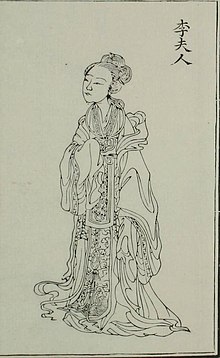Lady Li
| Lady Li | |
|---|---|
 |
|
| Spouse(s) | Emperor Wu of Han |
| Children | Liu Bo, Prince Ai of Changyi |
| Relatives |
Li Yannian (brother) Li Guangli (brother) Liu He (grandson) |
Li Furen (Chinese: 李夫人) was a concubine who married and produced offspring for Emperor Han Wudi, the seventh emperor of the Han Dynasty of China, who ruled from 141 — 87 BC. Emperor Wudi's foreign policies resulted in great territorial acquisitions for Han China, together with organization of a strong, centralized imperial state bolstered by Confucian ideology, giving Wudi title to be considered one of the greatest or the greatest emperor of Han Dynasty China, and one of the greatest emperors in Chinese history. However, in the field of poetry, the great Emperor Wudi is more remembered for his great personal grief in his domestic life at the loss of his beloved "Lady Li", Li Furen, as recorded in a well-known poem, written from the viewpoint of the persona of Wudi. This is a famous and frequently translated poem into English. One version goes:
The sound of her silk skirt has stopped.
On the marble pavement dust grows.
Her empty room is cold and still.
Fallen leaves are piled against the doors.
Longing for that lovely lady
How can I bring my aching heart to rest?
Li Furen's concubinage/marriage to the emperor, Han Wudi, came about by the circumstance that her brother, Li Yannian was a musician for Princess Pingyang and composed the song Jiarenqu (literally, The Beauty Song) as an ode to her beauty. After hearing this song, Emperor Wu wanted to meet the woman who could inspire such a song. Enamored of her, she became one of Emperor Wu's concubines and bore him a son named Bo (髆). The date of her death is unrecorded, but Emperor Wu's profound sadness is recorded in the Han-Shu. Likewise a famous poem has been recorded as being written by the grief-stricken Emperor. However, although composed in the persona of Han Wudi, there is doubt as to the actual authorship of this and similar poems.
...
Wikipedia
